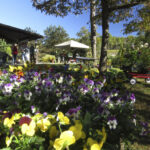Restaurants were allowed to re-open under certain guidelines in 89 of the state’s 95 counties on Monday, and retail stores can re-open under similar guidelines on Wednesday.
The guidelines include operating at 50 percent capacity and maintaining social distance (generally keeping people at least six feet apart). The state recommends no live music, and restaurant bars should be kept closed. The state also recommends that employees in both industries wear cloth face coverings and that business owners follow federal guidelines for hygiene and workplace sanitation standards for COVID-19.
The 85 counties where restaurants and retail stores can re-open include Anderson and Roane counties.
Many businesses have been closed or operating under changed conditions as Tennessee, like other states and countries, tried to reduce the spread of COVID-19, a contagious respiratory illness that can be deadly.
“Tennesseans pulled together to flatten the curve, and it is time for people to begin to get back to work and back to their businesses,” Tennessee Governor Bill Lee said. “We are pursuing a careful, measured approach to reopening our economy that does not depend on heavy-handed mandates but instead provides practical tools for businesses of all sizes.”
Last week, Lee announced he would not extend the statewide stay-at-home order past Thursday, April 30, and he said restaurants and retailers could re-open this week. It’s part of a phased re-opening of the economy.
Lee said retail stores and restaurants are the vast majority of businesses closed across the state.
Guidelines for re-opening gyms and fitness centers, churches, physicians’ offices, and hospitals could be provided this week.
Businesses that are considered “close contact” such as hair, nail, and tanning salons, and tattoo parlors will not re-open until phase two of the governor’s plan. Those businesses, where it’s difficult to separate employees from customers, could open later in May, Lee said Friday.
Lee and Tennessee officials have announced guidelines that they want businesses, employees, and customers to use to help make the re-opening of restaurants and retail stores safer.
Here are the guidelines, provided by the City of Oak Ridge.
Guidelines for Daily Business Activity—Maintaining Social Distancing
- Minimize or eliminate the need for waiting rooms and lobby areas by using outdoor space or asking customers to remain in vehicles.
- Install protective barriers where a six-foot separation is not possible to protect customers and employees.
- Sanitize common-use areas and amenities such as coffee pots, microwaves, refrigerators, restrooms, doors, computers, and printers.
- Use online meeting services when possible to reduce social interaction.
- Use external spaces outside of businesses to maintain social distancing requirements of six feet.
- Limit gatherings to no more than 10 people and make sure appropriate distances are maintained.
- Encourage online shopping and store-to-business delivery.
- Engage in telecommuting with employees when possible.
- Limit points of entry by public.
- Clean and sanitize frequently.
Planning for Restaurants and Facilities
- Provide personal protective equipment for employees to handle food or merchandise.
- Face coverings and gloves are to be used by employees, and customers are encouraged to use masks (except customers may remove face coverings while eating and drinking).
- Establish social distancing of six feet between tables, chairs, and people.
- Capacity (50 percent) is based on the number of tables before March 1, 2020. The six-foot distance is measured from the back of one chair to the back of another. The capacity plan should not include the bar area.
- Tables and chairs should be cleaned after each seating or turnover of customers.
- Shared condiment containers must cleaned after each customer, and single use condiment packets are encouraged.
- Restaurants with a bar may serve dine-in customers or as part of to-go orders. Beer licenses by state law are for premises only and do not include areas outside of restaurants or patio facilities.
- Curbside pickup and delivery are encouraged as alternate options
- No live music or dance floors. This is to prevent customers and employees from congregating.
- No self-service buffets, salad bars, or self-service condiment or beverage stations that require the consumer to touch any part of the dispensing apparatus. No refills on self-service beverages.
- Continuously screen incoming employees and customers for symptoms and use temperature checks before accessing facilities.
Planning for Retail Stores and Facilities
- Employees and customers should always wear face coverings inside stores.
- Develop shopping hours for elderly and vulnerable populations.
- Continuously prompt customers to observe social distancing.
- Retail stores should use 50 percent of the defined store capacity limits. Third-party vendor space is separate. Call (865) 425-3524 with questions.
- Rearrange floor displays and racks to encourage one-way routing or the greater separation of customers.
- Employees should frequently clean hands with sanitizer or soap.
Remaining Regulated Public Facilities
- Current Tennessee executive orders state that bars, salons, barbershops, theaters, and gyms are not included in the above changes and will remain closed.
- Government buildings will remain closed to the public except for arranged visits and appointments.
- Public playground facilities will remain closed.
- Gatherings of more than 10 people are prohibited by executive order, except equivalents of the 50 percent capacity rule for restaurants.
The state guidance can be found here.
Tennessee Department of Tourist Development Commissioner Mark Ezell, who chairs the Tennessee Economic Recovery Group, said the state’s guidelines for restaurants and retail stores were developed in cooperation with business leaders in both sectors, mayors from across the state, and members of the legislature and health experts, as well as Unified Command, which includes the Tennessee Department of Health. He said the re-opening of future sectors would be accomplished with similar input from industry leaders and elected officials.
“We need Tennessee businesses, workers, and consumers to step up and pledge to follow these guidelines,” Ezell said. “It is critically important that we maintain our commitment to social distancing and adhere to these new guidelines so that we can continue to reopen our economy.”
The governor is working separately with Knox, Madison, Davidson, Hamilton, Shelby, and Sullivan counties and their health departments to plan their own re-opening strategies.
Restaurant industry guidance can be downloaded here, retail industry guidance can be downloaded here, and general guidance for Tennessee businesses can be downloaded here.
A comprehensive summary of the guidance can be downloaded here.
Lee and the Economic Recovery Group will provide specific guidance for more Tennessee industries in the coming weeks. More information on the Tennessee Pledge is available here, and more information on Tennessee’s Economic Recovery Group is available here.
If a restaurant does not operate in a safe manner, or if health outcomes demonstrate that a particular business or industry sector is unable to be operated in a sufficiently safe manner, the governor and/or other applicable state officials may issue additional orders concerning that business or industry, the governor’s office said.









Leave a Reply